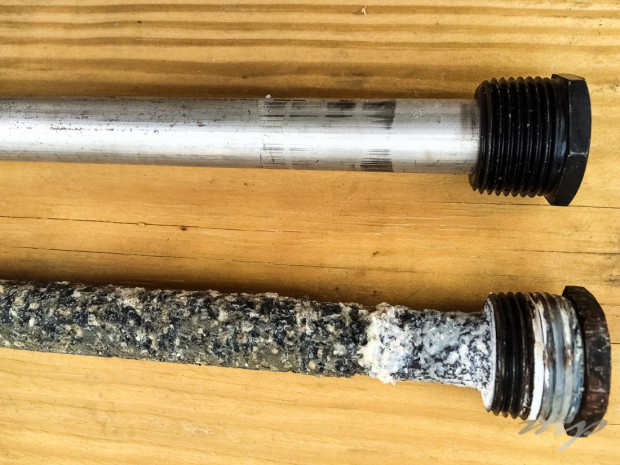While at Sikeston, MO, I checked the water heater anode rod in our 5th Wheel RV. A sacrificial anode rod is a rod made of Magnesium, Aluminum or a combination of Aluminum, Zinc and Tin which in simple terms diverts corrosive action away from the tank walls and onto itself.
As the name sacrificial indicates, the anode rod will slowly corrode away by chemical reaction as it protects the rest of the tank. There’s a whole science behind it based upon different types of metals but I’m not sure I understand it all or could explain it. The good news is the anode rod can be replaced at a very reasonable cost with only a little knowledge and effort. Replacing the anode rod at regular intervals will increase the life of the water heater, saving money, time and the inconvenience of having to replace the water heater. The condition of an anode rod (and whether it is time to replace it) depends upon the water quality, how much the water heater is used, the running temperature, and the craftsmanship of the tank itself.
The photo above shows the condition of the anode rod from out 5th Wheels water heater (bottom rod) after five months of use. The new rod (top) is also shown in the photo. In this case, I replaced the old rod since I already had it out and had a replacement.
I’m checking the anode rod every six months. A RV’ing friend was checking his every year and before he got around to checking it his anode rod corroded to the point of falling apart with pieces traveling through the plumbing, one lodging in a faucet requiring that faucet to be replaced (once they break up the pieces no longer corrode away.)
On most RV’s checking/replacing the anode rod is a simple process and can be accessed from outside:
- Turn off the water heater;
- Turn on the hot water faucets inside until the hot water is exhausted (you don’t want to scald yourself);
- When the water is no longer hot, turn off the water to the RV;
- Using a socket and wrench remove the old anode (check the documentation for your water heater to see exactly where your anode is located.) Note: removing the anode in many cases will drain most of the water lines in the RV so be ready to step to one side or else get wet;
- Examine and replace the anode if required. Tighten the anode back into place;
- Turn the water back on and examine for leaks;
- Use the water heater pressure relief valve to remove air from the water heater tank;
- Turn on the faucets in the RV until all the air is out of the lines; and then
- Turn the hot water heater back on.
Notes: It may seem like a lot of steps but it only takes about 15 minutes. These are the steps I followed…the steps you follow may deviate from these depending upon your RV and circumstances. I could have used the water heater by-pass values so as not to have to turn off the water and drain most of the water lines in our RV but in our case accessing those values require removing a screwed on panel so I just find it easier to flush the whole system.

An ounce of prevention beats a pound of cure!
Yea, and an ounce is usually less expensive then a pound, Steve. ;-)
You forgot Step 10 – take some cool abstract macro photographs of that corroded rod! :-)
Humm….funny you mentioned that, Mark, I kept that old rod! LOL
Dang, never knew that. Thanks for sharing.
Monte, this has certainly been a learning experience for me and I figure others are or will be in a similar state. Happy to share! :-)
You should write a book. You could call it Zen and the Art of RV Maintenance
I’ll second that!
Cedric, I am only scraping the surface of what some of these folks who have been doing this for years knows about these things. They have some very useful and helpful web sites that I often use for reference. No book deals for me! LOL
“Sacrificial anode”? Who comes up with these names? Sounds like an ancient Mayan ceremony…..
I too like Cedric’s suggestion – just take lots of notes along the way!
Yeah, Paul M, I agree the name’s a little over the top but it is what it is! :-)
Hmmm. This retirement thing sounds like a bit of work … washing the top of the RV, using sacrificial anode rods, etc. I think that I like Maggie’s role – ride around, have fun, no work – well, except for the work of finding a hiding place when a thunderstorm rolls in. :D
Paul’s right!
Paul, it’s a lots more work then I first imagined. But it’s still less work then keeping a whole house and yard up. As for Maggie’s job, I’ve looked into it and those positions seem to be few and far between…and it’s not Maggie’s going to give up hers…heck I can’t even get her out of my chair. :-)